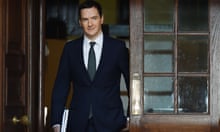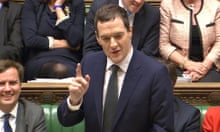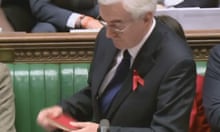The Treasury’s independent forecaster has conceded there are big uncertainties in its predictions for higher tax revenues after the chancellor used the prospective windfall to justify a softer pace of cuts in his autumn statement.
The Office for Budget Responsibility said it now expects more money to flow into government coffers from income taxes, corporation tax and VAT than it did at the time of its last forecasts, at George Osborne’s summer budget four months ago. The OBR also expects the government to gain some fiscal headroom thanks to lower interest payments on its debts.
Together, the higher tax revenue and lower interest payments amounted to a £27bn improvement in the public finances compared with July’s budget, Osborne said as he presented his autumn statement to parliament.
The windfall allowed the chancellor to rewrite his spending review for the next four years, junking highly controversial plans to scrap tax credits and avoiding further police cuts as well as easing some of the spending cuts across government.
Nevertheless, specific cuts announced on Wednesday included:
- An end to grants for student nurses, who must now pay for their own training with the help of loans. The cap on recruitment of student nurses will be lifted.
- Higher student loan repayments for people who have graduated since 2012 and will have to pay about £300 a year more.
- A £15m boost for women’s charities to be paid from the so-called tampon tax – the VAT levied on sanitary products.
- A cap on housing benefit rates in the social housing sector, limiting them to the same rate as private-sector housing benefit rates.
- A 19% cut in state funding for opposition parties.
- An overhaul of schools funding to even out regional variations and cuts to the further education budget that will mean funding per student for 16- to 19-year-olds in sixth forms and colleges is cut by 9.4% by 2020.
The OBR’s more optimistic outlook for tax receipts came as it left its forecast for UK GDP growth this year at 2.4% while cutting its forecast for global growth this year and next.
It now sees the economy growing 2.4% next year and 2.5% in 2017, compared with July forecasts for 2.3% and 2.4% respectively.
“The outlook for the economy has not changed a great deal since our last forecast in July,” said OBR chairman Robert Chote. “But there have been somewhat bigger changes to the outlook for the public finances. The underlying fiscal position looks somewhat stronger over the medium term than it did in July.”
With the new forecasts, Osborne appeared able to row back on his planned tax credit cuts while also easing the scale of expected cuts on government departments’ budgets, all while sticking to his target to run a budget surplus by the end of the decade.
The OBR forecast a surplus of £10.1bn in 2019-20, up marginally from July’s forecast of £10bn.
But Chote conceded that forecasts for tax revenues were always vulnerable to a degree of uncertainty and in areas such as tax avoidance crackdowns the prospective windfalls were particularly hard to predict.
Asked how confident the public could be in the OBR’s forecasts for higher tax revenues, Chote emphasised that they were based on the mid-point from a range of likely paths.
“There is a 50% chance they [tax receipts] will be higher and a 50% chance they will be lower, by definition,” he said. “There are … particular uncertainties that arise out of the underlying forecast and there are uncertainties about how the latest sets of policy measures are going to affect those … There is enormous uncertainty around these things, but our best judgment is that the uncertainties are equally distributed above and below.”
Based on the OBR’s latest analysis, Chote’s team expect extra revenue for the exchequer of £2.5bn this year, £4.1bn next year, £6.3bn in 2017-18 and £5.4bn in the year after that.
Explaining the rosier picture, Chote said “income tax and corporation taxes have come in stronger than we expected, which pushes through the forecast”. In addition, the OBR had made significant changes to the way it models VAT deductions and national insurance contributions. Those changes boost receipts by more than £6bn by the tax year 2020-21.
Against the backdrop of a slowdown in the global economy and after the latest official figures showed the worst October for the public finances in six years, many economists remained sceptical that tax receipts would pick up as fast as the OBR predicted.
Samuel Tombs, at the consultancy Pantheon Macroeconomics, said Osborne was “dealt a kind hand” by the OBR, adding: “The OBR is still too upbeat on austerity’s impact on GDP, tax avoidance revenues and the interest bill.”
Similarly, Allan Monks, economist at JPMorgan, described the OBR’s latest outlook as “an early Christmas present” for the chancellor. “One risk is that tax revenues fall short of the OBR’s expectations – we note the recent shortfall in government receipts so far this year – or that growth undershoots the OBR’s projections next year,” said Monks.
Howard Archer, at the consultancy IHS Global Insight, said it was “questionable” whether the UK economy could grow as fast as the OBR forecasts. “There are obviously major uncertainties to the outlook, not least the potential economic impact of the forthcoming referendum on UK membership of the European Union,” he said.
“The chancellor announced that Britain ‘now has a permanent pothole fund’ and it is difficult not to wonder how many potholes George Osborne is likely to come across over the coming years as he looks to achieve a surplus of £10.1bn in 2019/20.”
The OBR stuck to an earlier forecast that employment growth would ease off as productivity picks up. But it also trimmed its outlook for wage growth after the chancellor announced a levy on employers to help fund apprenticeships.
Chote said: “The apprenticeship levy behaves like a payroll tax, so we assume that the costs are passed on into lower profits and – primarily – lower wages ... Bear in mind that this comes on top of the higher minimum wage and auto-enrolment into pension saving, which also increase business costs.”
Despite the slower-than-expected pace of spending cuts, some economists noted that the overall picture was still one of tightening.
Martin Beck, of the consultancy Oxford Economics, said: “A stronger revenue forecast gave the chancellor room to scrap plans to cut tax credits next April and modestly increase overall government spending. That said, the autumn statement’s modest net ‘giveaway’ next year will be quickly eroded by tax rises. And the spending review confirmed that the economy faces a serious fiscal squeeze over the next few years.”








Comments (…)
Sign in or create your Guardian account to join the discussion